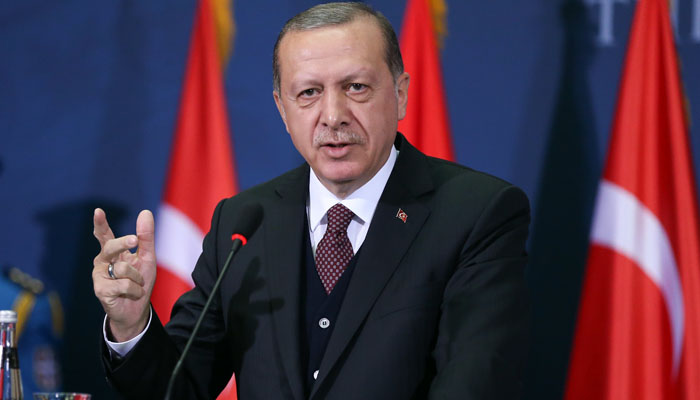Turkish President Recep Tayyip Erdoğan said on Tuesday that Metin Topuz, a US consulate staff member who was arrested by Turkish authorities on Oct. 4, was a spy and said it was Turkey’s right to take steps against an “internal threat.”
Speaking during a press conference with his Serbian counterpart, Aleksandar Vucic, in Belgrade, Erdoğan said Topuz and another staff member for whom a detention warrant has been issued by Turkish authorities were spies and added that they were also accused of ties to the Gülen movement, which the Turkish government claims was behind a failed coup last year.
Accusing US Ambassador John Bass of wrecking relations between two NATO allies by suspending non-immigrant visa services in Turkey, Erdoğan said he and other members of his government would not agree to a request for a farewell visit with Bass and added that “we do not see him as a representative of the US.”
“It is thought-provoking that an ambassador [John Bass] in Ankara took a decision [suspending visa services in Turkey] and says ‘I took it in the name of my state.’ If this is the case, there is nothing for us to talk about with the US administration. If it is not like that and this ambassador has taken the decision himself, then the US administration should not keep him there [in Ankara] for a minute longer,” he said.
Underling that the recent detention and warrants for staff members of the US Consulate General in İstanbul show that some spying was going on, Erdoğan asked: “How did these spies infiltrate the American consulate? If they didn’t infiltrate it, who put them there?”
US. Ambassador Bass said in a video message released late Monday that Turkish authorities had failed to show any evidence against Topuz and that he had insufficient access to a lawyer. He also said the arrest “raised questions whether the goal of some officials is to disrupt the long-standing cooperation between Turkey and the US.”
Ties between the two NATO allies were already strained over Pennsylvania-based Turkish Islamic scholar Fethullah Gülen’s presence in the US and Washington’s support for a Syrian Kurdish militia that Turkey considers to be terrorist because of its links to outlawed Kurdistan Workers’ Party (PKK) militants fighting Turkey.
Also, indictments in the US naming bodyguards of Erdoğan who were engaged in violence in Washington and for the manager of the state-run Halkbank and a former Turkish economy minister accused of conspiring to violate US sanctions on Iran had deepened the rift.

